仁爱科普版(2024)七年级英语下册 Unit 11 Rules Matter! Grammar in Use 课件 (共29张PPT)
文档属性
| 名称 | 仁爱科普版(2024)七年级英语下册 Unit 11 Rules Matter! Grammar in Use 课件 (共29张PPT) | 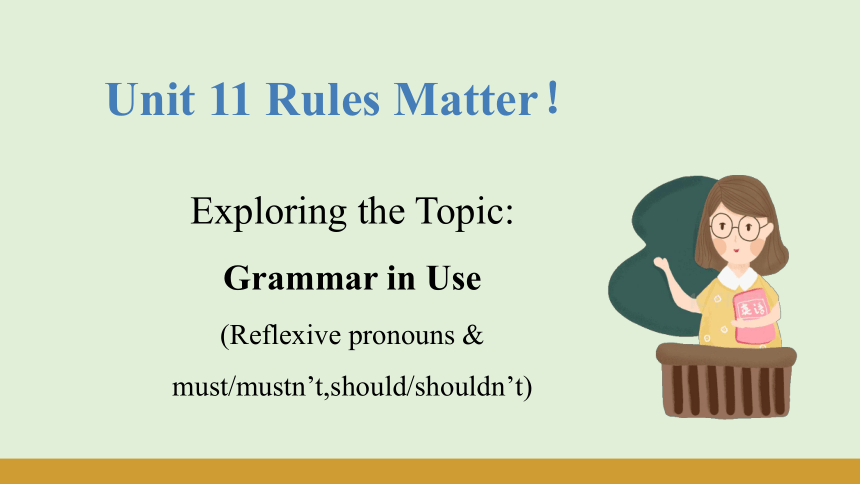 | |
| 格式 | pptx | ||
| 文件大小 | 17.5MB | ||
| 资源类型 | 教案 | ||
| 版本资源 | 仁爱科普版 | ||
| 科目 | 英语 | ||
| 更新时间 | 2025-04-03 19:32:23 | ||
图片预览

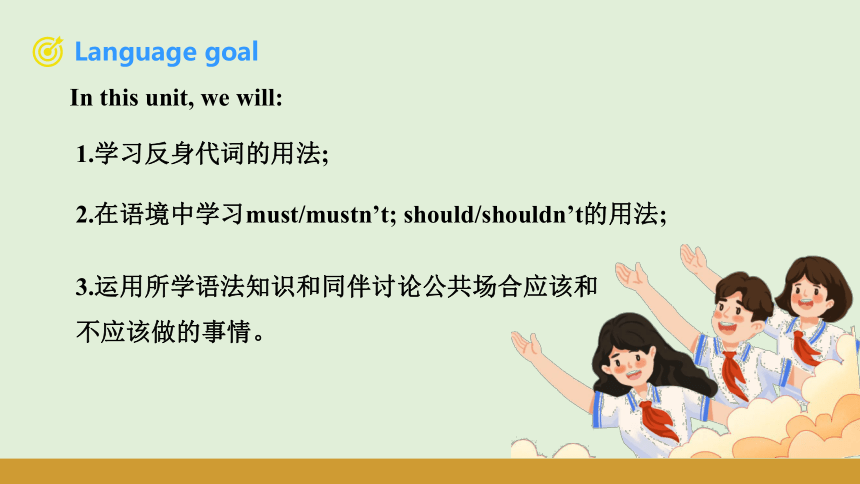
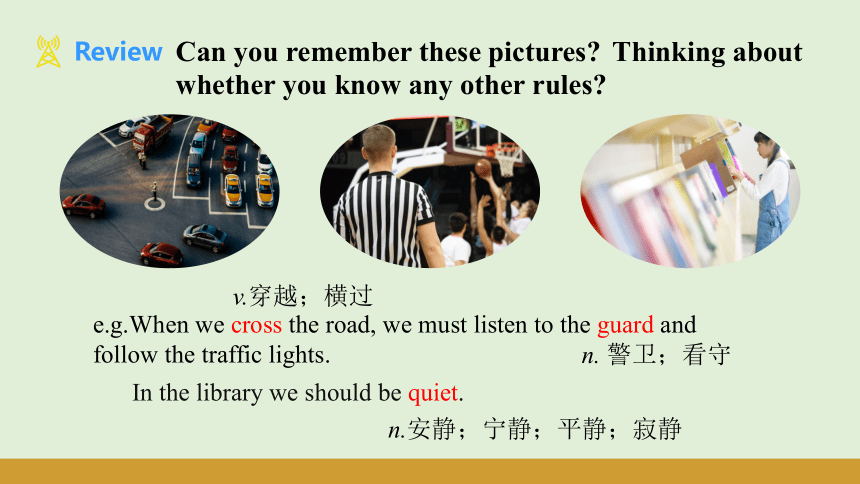
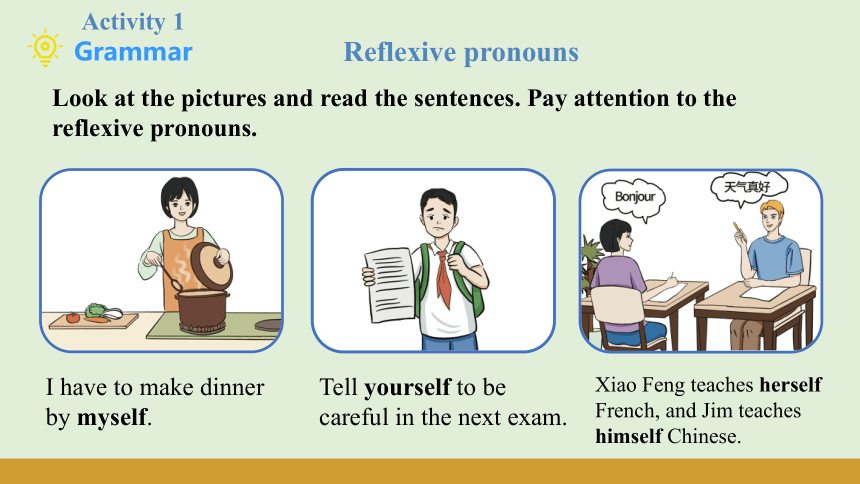
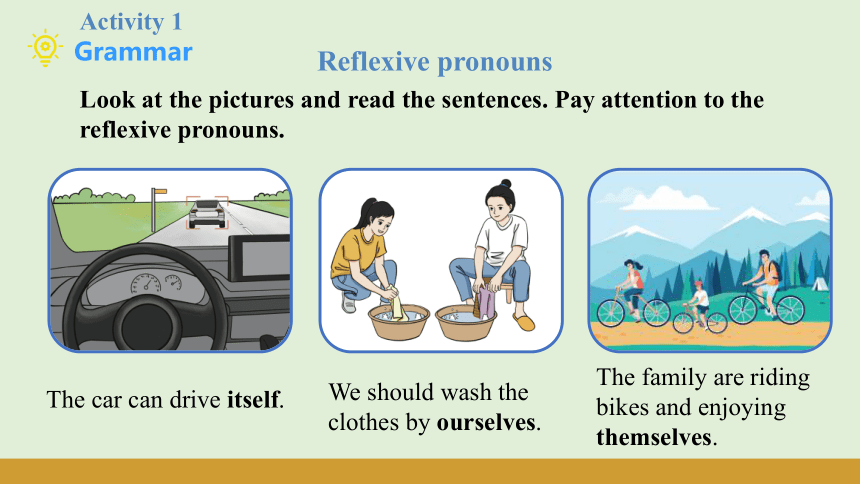
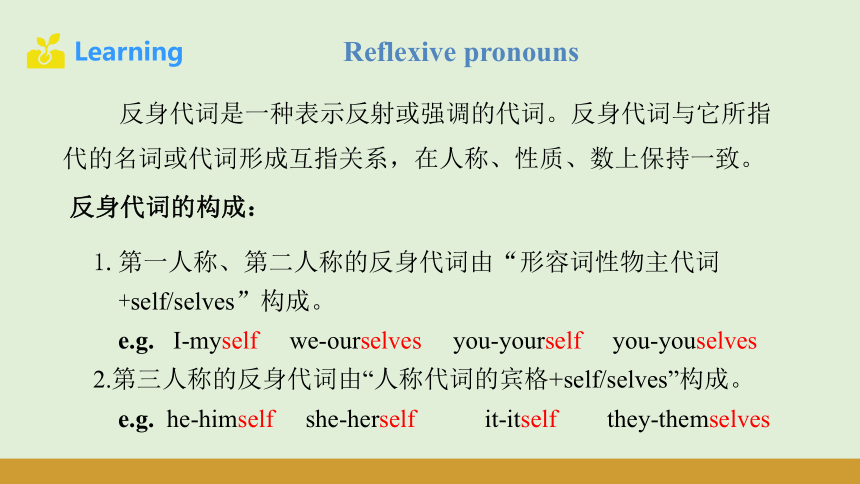
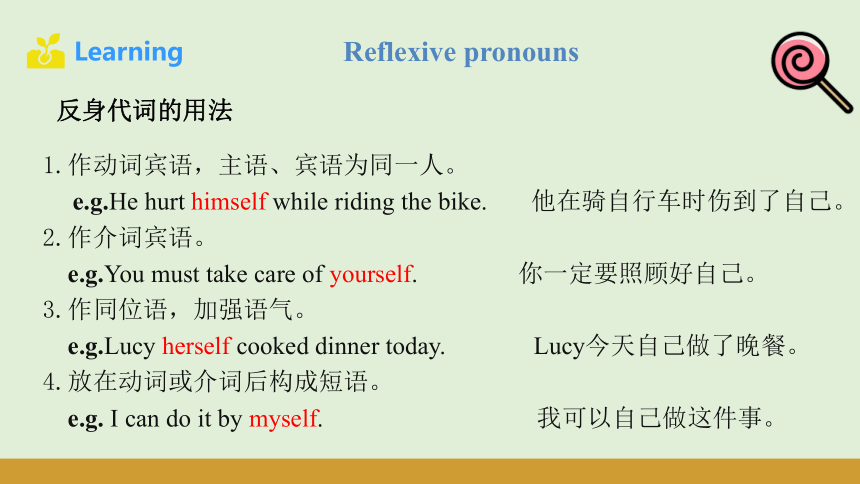
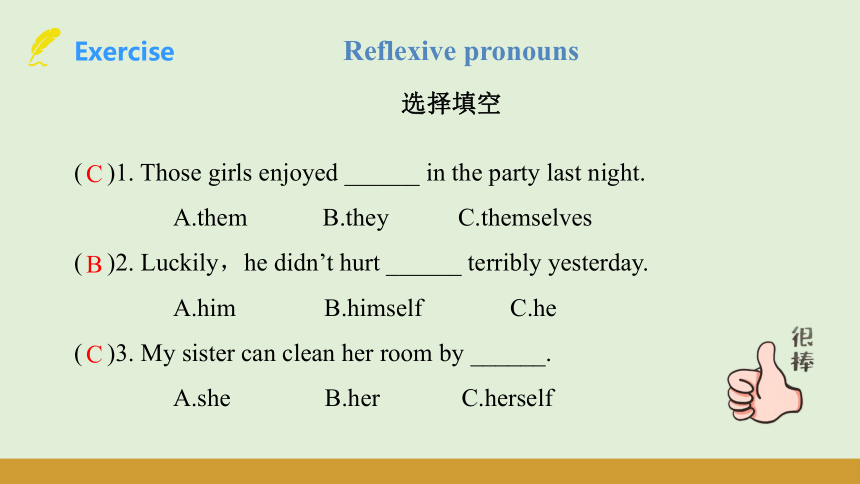
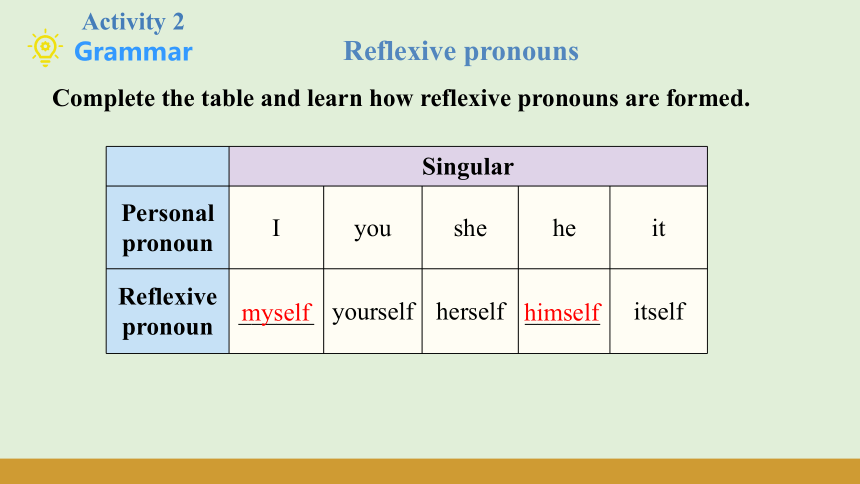
文档简介
(共29张PPT)
Unit 11 Rules Matter!
Exploring the Topic:
Grammar in Use
(Reflexive pronouns & must/mustn’t,should/shouldn’t)
1.学习反身代词的用法;
2.在语境中学习must/mustn’t; should/shouldn’t的用法;
3.运用所学语法知识和同伴讨论公共场合应该和
不应该做的事情。
In this unit, we will:
Can you remember these pictures Thinking about whether you know any other rules
e.g.When we cross the road, we must listen to the guard and follow the traffic lights.
v.穿越;横过
n. 警卫;看守
In the library we should be quiet.
n.安静;宁静;平静;寂静
Activity 1
Reflexive pronouns
Look at the pictures and read the sentences. Pay attention to the reflexive pronouns.
I have to make dinner by myself.
Tell yourself to be careful in the next exam.
Xiao Feng teaches herself French, and Jim teaches himself Chinese.
Activity 1
Reflexive pronouns
Look at the pictures and read the sentences. Pay attention to the reflexive pronouns.
The car can drive itself.
We should wash the clothes by ourselves.
The family are riding bikes and enjoying themselves.
Reflexive pronouns
反身代词是一种表示反射或强调的代词。反身代词与它所指代的名词或代词形成互指关系,在人称、性质、数上保持一致。
反身代词的构成:
1.第一人称、第二人称的反身代词由“形容词性物主代词
+self/selves”构成。
e.g. I-myself we-ourselves you-yourself you-youselves
2.第三人称的反身代词由“人称代词的宾格+self/selves”构成。
e.g. he-himself she-herself it-itself they-themselves
Reflexive pronouns
反身代词的用法
1.作动词宾语,主语、宾语为同一人。
e.g.He hurt himself while riding the bike. 他在骑自行车时伤到了自己。
2.作介词宾语。
e.g.You must take care of yourself. 你一定要照顾好自己。
3.作同位语,加强语气。
e.g.Lucy herself cooked dinner today. Lucy今天自己做了晚餐。
4.放在动词或介词后构成短语。
e.g. I can do it by myself. 我可以自己做这件事。
选择填空
( )1. Those girls enjoyed ______ in the party last night.
A.them B.they C.themselves
( )2. Luckily,he didn’t hurt ______ terribly yesterday.
A.him B.himself C.he
( )3. My sister can clean her room by ______.
A.she B.her C.herself
Reflexive pronouns
C
B
C
Activity 2
Reflexive pronouns
Complete the table and learn how reflexive pronouns are formed.
Singular Personal pronoun I you she he it
Reflexive pronoun ______ yourself herself ______ itself
myself
himself
Activity 2
Reflexive pronouns
Complete the table and learn how reflexive pronouns are formed.
Plural Personal pronoun we you they
Reflexive pronoun ______ yourselves themselves
ourselves
Can you discuss and summarize the rules on how reflexive pronouns are formed.
Reflexive pronouns
反身代词的固定搭配
by oneself 独自
look after oneself 照顾自己
hurt oneself 伤到自己
enjoy oneself 玩的开心
teach oneself 自学
believe in oneself 相信自己
depend on oneself 依靠自己
between oneself 在……之间
Reflexive pronouns
人称代词 单/复数 主格 宾格 物主代词 反身代词
形容词 名词 第一人称 (我) 单数 I me my mine myself
复数 we us our ours ourselves
第二人称 (你) 单数 you you your yours yourself
复数 you you your yours youselves
Reflexive pronouns
人称代词 单/复数 主格 宾格 物主代词 反身代词
形容词 名词 第三人称(他/她/它) 单数 he him his his himself
she her her hers herself
it it its its itself
复数 they them their theirs themselves
看图写话
1. homework, himself
__________________________________________________
2. clean, room, ourselves
__________________________________________________
3. yesterday, supermarket, herself
__________________________________________________
1 2 3
He does his homework himself.
We should clean our room ourselves.
She goes to the supermarket by herself.
Reflexive pronouns
Reflexive pronouns
你答对了吗?
红绿灯判断游戏
1.你要照顾好自己。
You should look after yourself. ( )
2.她自己做了一条连衣裙。
She made a dress by her. ( )
3.他在家自学法语。
He teaches himself French at home. ( )
√
×
√
Activity 3
Reflexive pronouns
Read the text and fill in the blanks with the correct form of the given words.
Traffic rules are important to everyone because they keep people safe. It’s useful for us to learn and follow them.Drivers should always tell __________(they) never to break the traffic rules. As students,we should remember the rules of the road, too. We should try our best to learn the rules of the road by _________(we), such as traffic signs and traffic lights. People should always keep traffic rules in mind because they are good for others and ___________(they).
themselves
ourselves
themselves
Reflexive pronouns
herself
French
itself
ourselves
break
teach oneself
pron. 她自己
n. 法语;法国人
adj. 法国的;法国人的;法语的
pron. 它自己(指施动并受其影响的动物或事物)
pron. 我们自己
v. 违犯,背弃; (使)破;弄坏;弄破;稍停
n. 休息
自学
Activity 1
Pair work. Read the conversation. Pay attention to the usage of modal verbs.
must/mustn’t,should/shouldn’t
Kangkang, we learned some trffic rules this afternoon. Do you remember them
You’re right. Rule 2: We mustn’t run on the streets.
Yes. Traffic rules are very important for our safety.
Yes, I do. Rule 1: We must look at both sides before crossing the road.
Yes, it’s not safe. Rule 3: We shouldn’t put our heads or hands out of the car window.
Right. We should always follow the traffic rules.
★情态动词:表示情感、态度的动词,情态动词名字中含有“动词”,但实际上不是动词,更为准确的叫法是情态助动词,不可以单独作谓语。
must/mustn’t,should/shouldn’t
情态动词的几个特点:
1、很像助动词,但是有词义;
2、不能单独作谓语,需要加动词原形,一起作谓语;
3、无人称变化,加动原,无人称、数的变化,但是有时态;
4、否定句:情态动词后+not。
must/mustn’t,should/shouldn’t
should作为情态动词,通常用来表示现在或将来的责任或义务,意为“应该,应当”。其否定形式为shouldn’t
1.情态动词should的肯定句
主语+should+动词原形+其他.
e.g.:He should help his mother with the housework.
他应该帮他的母亲做家务。
2.情态动词should的否定句
主语+should+not+动词原形+其他.
e.g.:You shouldn’t read loudly.
你不应该读这么大声。
must/mustn’t,should/shouldn’t
3.情态动词should的一般疑问句
Should+主语+动词原型+其他?
肯定回答: Yes,主语+should. 否定回答:No,主语+shouldn’t.
e.g.:—Should he go home
他应该回家吗?
—Yes,he should. 是的,他应该。
—No,he shouldn’t. 不,他不应该。
must/mustn’t,should/shouldn’t
must作为情态动词,用来讨论义务和必要,意为“必要,必须”。其否定形式为mustn’t
1.情态动词must的肯定句
主语+must+动词原型+其他.
e.g.:You must come in time.
你必须及时到来。
2.情态动词must的否定句
主语+must+not+动词原形+其他.
e.g.:You mustn’t play with fire.
你不许玩火。
must/mustn’t,should/shouldn’t
3.情态动词的一般疑问句
Must+主语+动词原型+其他?
肯定回答:Yes,主语+must. 否定回答:No,主语+needn’t/don’t have to.
e.g.: —Must I finish my homework
我现在必须完成作业吗?
—Yes,you must. 是的,你必须要完成。
—No,you needn’t./don’t have to. 不,你不必。
否定回答不能用mustn't,要用needn't 或don't have to.
Activity 2
Complete the table and learn how to use must/mustn’t and should/ shouldn’t.
must/mustn’t,should/shouldn’t
Positive Negative
should/must shouldn’t/mustn’t
1. At home,we ________ respect the old and care for the young. 2. There are many people on the street, so you ________ drive slowly. 3. You _________ play with fire. 4. In an art museum, we __________ speak loudly. 5. When you are traveling in other countries, you need to know the rules and ________ break the law. should
should
mustn’t
shouldn’t
mustn’t
Activity 3
Fill in the blanks with should or shouldn’t and put the rules in each suitable box.
must/mustn’t,should/shouldn’t
You________ keep quiet.
You________ ask for help.
You________ cry out.
You________ care for the old.
You________ wait at the red light.
You________ play on the road.
You________ listen to the advice.
You________ pay attention.
should
should
shouldn’t
should
should
shouldn’t
should
should
You should wait at the red light.
You should ask for help.
You shouldn’t cry out.
You should care for old.
You shouldn’t play on the road.
You should pay attention
On the street
You should wait at the red right.
You should ask for help.
You shouldn’t cry out.
You should care for old.
You should play on the road.
You should pay attention.
In the hospital
You should keep quiet.
You should ask for help.
You shouldn’t cry out.
You should listen to the advice.
You should care for old.
must/mustn’t,should/shouldn’t
head
slowly
speak
loudly
law
advice
attention
play with sth.
ask for
n. 头;负责人
v. 前往
adv. 慢速地;缓慢地
v. 说话;谈话
adv. 吵闹地;嘈杂地
n. 法律;法规
n. 劝告;建议
n. 注意;专心
摆弄;玩弄
请求,恳求(给予)
1. We _________ give our seats to old people when we are on a bus.
(should/shouldn’t)
2. We _____________ laugh at others. (should/shouldn’t)
3. They __________ be hungry after such a long walk. (must/mustn’t)
4. The children __________ play in the street. (must/mustn’t)
选词填空
must/mustn’t,should/shouldn’t
should
shouldn’t
must
mustn’t
In this class, we have
1. learned reflexive pronouns;
2. learned the usage of modal verbs must/mustn't and
should/shouldn't and practiced it ;
3. learned more rules in public places.
1. Practice more about reflexive pronouns and the usage of modal verbs must/mustn't and should/shouldn't ;
2.Finish the exercises.
Unit 11 Rules Matter!
Exploring the Topic:
Grammar in Use
(Reflexive pronouns & must/mustn’t,should/shouldn’t)
1.学习反身代词的用法;
2.在语境中学习must/mustn’t; should/shouldn’t的用法;
3.运用所学语法知识和同伴讨论公共场合应该和
不应该做的事情。
In this unit, we will:
Can you remember these pictures Thinking about whether you know any other rules
e.g.When we cross the road, we must listen to the guard and follow the traffic lights.
v.穿越;横过
n. 警卫;看守
In the library we should be quiet.
n.安静;宁静;平静;寂静
Activity 1
Reflexive pronouns
Look at the pictures and read the sentences. Pay attention to the reflexive pronouns.
I have to make dinner by myself.
Tell yourself to be careful in the next exam.
Xiao Feng teaches herself French, and Jim teaches himself Chinese.
Activity 1
Reflexive pronouns
Look at the pictures and read the sentences. Pay attention to the reflexive pronouns.
The car can drive itself.
We should wash the clothes by ourselves.
The family are riding bikes and enjoying themselves.
Reflexive pronouns
反身代词是一种表示反射或强调的代词。反身代词与它所指代的名词或代词形成互指关系,在人称、性质、数上保持一致。
反身代词的构成:
1.第一人称、第二人称的反身代词由“形容词性物主代词
+self/selves”构成。
e.g. I-myself we-ourselves you-yourself you-youselves
2.第三人称的反身代词由“人称代词的宾格+self/selves”构成。
e.g. he-himself she-herself it-itself they-themselves
Reflexive pronouns
反身代词的用法
1.作动词宾语,主语、宾语为同一人。
e.g.He hurt himself while riding the bike. 他在骑自行车时伤到了自己。
2.作介词宾语。
e.g.You must take care of yourself. 你一定要照顾好自己。
3.作同位语,加强语气。
e.g.Lucy herself cooked dinner today. Lucy今天自己做了晚餐。
4.放在动词或介词后构成短语。
e.g. I can do it by myself. 我可以自己做这件事。
选择填空
( )1. Those girls enjoyed ______ in the party last night.
A.them B.they C.themselves
( )2. Luckily,he didn’t hurt ______ terribly yesterday.
A.him B.himself C.he
( )3. My sister can clean her room by ______.
A.she B.her C.herself
Reflexive pronouns
C
B
C
Activity 2
Reflexive pronouns
Complete the table and learn how reflexive pronouns are formed.
Singular Personal pronoun I you she he it
Reflexive pronoun ______ yourself herself ______ itself
myself
himself
Activity 2
Reflexive pronouns
Complete the table and learn how reflexive pronouns are formed.
Plural Personal pronoun we you they
Reflexive pronoun ______ yourselves themselves
ourselves
Can you discuss and summarize the rules on how reflexive pronouns are formed.
Reflexive pronouns
反身代词的固定搭配
by oneself 独自
look after oneself 照顾自己
hurt oneself 伤到自己
enjoy oneself 玩的开心
teach oneself 自学
believe in oneself 相信自己
depend on oneself 依靠自己
between oneself 在……之间
Reflexive pronouns
人称代词 单/复数 主格 宾格 物主代词 反身代词
形容词 名词 第一人称 (我) 单数 I me my mine myself
复数 we us our ours ourselves
第二人称 (你) 单数 you you your yours yourself
复数 you you your yours youselves
Reflexive pronouns
人称代词 单/复数 主格 宾格 物主代词 反身代词
形容词 名词 第三人称(他/她/它) 单数 he him his his himself
she her her hers herself
it it its its itself
复数 they them their theirs themselves
看图写话
1. homework, himself
__________________________________________________
2. clean, room, ourselves
__________________________________________________
3. yesterday, supermarket, herself
__________________________________________________
1 2 3
He does his homework himself.
We should clean our room ourselves.
She goes to the supermarket by herself.
Reflexive pronouns
Reflexive pronouns
你答对了吗?
红绿灯判断游戏
1.你要照顾好自己。
You should look after yourself. ( )
2.她自己做了一条连衣裙。
She made a dress by her. ( )
3.他在家自学法语。
He teaches himself French at home. ( )
√
×
√
Activity 3
Reflexive pronouns
Read the text and fill in the blanks with the correct form of the given words.
Traffic rules are important to everyone because they keep people safe. It’s useful for us to learn and follow them.Drivers should always tell __________(they) never to break the traffic rules. As students,we should remember the rules of the road, too. We should try our best to learn the rules of the road by _________(we), such as traffic signs and traffic lights. People should always keep traffic rules in mind because they are good for others and ___________(they).
themselves
ourselves
themselves
Reflexive pronouns
herself
French
itself
ourselves
break
teach oneself
pron. 她自己
n. 法语;法国人
adj. 法国的;法国人的;法语的
pron. 它自己(指施动并受其影响的动物或事物)
pron. 我们自己
v. 违犯,背弃; (使)破;弄坏;弄破;稍停
n. 休息
自学
Activity 1
Pair work. Read the conversation. Pay attention to the usage of modal verbs.
must/mustn’t,should/shouldn’t
Kangkang, we learned some trffic rules this afternoon. Do you remember them
You’re right. Rule 2: We mustn’t run on the streets.
Yes. Traffic rules are very important for our safety.
Yes, I do. Rule 1: We must look at both sides before crossing the road.
Yes, it’s not safe. Rule 3: We shouldn’t put our heads or hands out of the car window.
Right. We should always follow the traffic rules.
★情态动词:表示情感、态度的动词,情态动词名字中含有“动词”,但实际上不是动词,更为准确的叫法是情态助动词,不可以单独作谓语。
must/mustn’t,should/shouldn’t
情态动词的几个特点:
1、很像助动词,但是有词义;
2、不能单独作谓语,需要加动词原形,一起作谓语;
3、无人称变化,加动原,无人称、数的变化,但是有时态;
4、否定句:情态动词后+not。
must/mustn’t,should/shouldn’t
should作为情态动词,通常用来表示现在或将来的责任或义务,意为“应该,应当”。其否定形式为shouldn’t
1.情态动词should的肯定句
主语+should+动词原形+其他.
e.g.:He should help his mother with the housework.
他应该帮他的母亲做家务。
2.情态动词should的否定句
主语+should+not+动词原形+其他.
e.g.:You shouldn’t read loudly.
你不应该读这么大声。
must/mustn’t,should/shouldn’t
3.情态动词should的一般疑问句
Should+主语+动词原型+其他?
肯定回答: Yes,主语+should. 否定回答:No,主语+shouldn’t.
e.g.:—Should he go home
他应该回家吗?
—Yes,he should. 是的,他应该。
—No,he shouldn’t. 不,他不应该。
must/mustn’t,should/shouldn’t
must作为情态动词,用来讨论义务和必要,意为“必要,必须”。其否定形式为mustn’t
1.情态动词must的肯定句
主语+must+动词原型+其他.
e.g.:You must come in time.
你必须及时到来。
2.情态动词must的否定句
主语+must+not+动词原形+其他.
e.g.:You mustn’t play with fire.
你不许玩火。
must/mustn’t,should/shouldn’t
3.情态动词的一般疑问句
Must+主语+动词原型+其他?
肯定回答:Yes,主语+must. 否定回答:No,主语+needn’t/don’t have to.
e.g.: —Must I finish my homework
我现在必须完成作业吗?
—Yes,you must. 是的,你必须要完成。
—No,you needn’t./don’t have to. 不,你不必。
否定回答不能用mustn't,要用needn't 或don't have to.
Activity 2
Complete the table and learn how to use must/mustn’t and should/ shouldn’t.
must/mustn’t,should/shouldn’t
Positive Negative
should/must shouldn’t/mustn’t
1. At home,we ________ respect the old and care for the young. 2. There are many people on the street, so you ________ drive slowly. 3. You _________ play with fire. 4. In an art museum, we __________ speak loudly. 5. When you are traveling in other countries, you need to know the rules and ________ break the law. should
should
mustn’t
shouldn’t
mustn’t
Activity 3
Fill in the blanks with should or shouldn’t and put the rules in each suitable box.
must/mustn’t,should/shouldn’t
You________ keep quiet.
You________ ask for help.
You________ cry out.
You________ care for the old.
You________ wait at the red light.
You________ play on the road.
You________ listen to the advice.
You________ pay attention.
should
should
shouldn’t
should
should
shouldn’t
should
should
You should wait at the red light.
You should ask for help.
You shouldn’t cry out.
You should care for old.
You shouldn’t play on the road.
You should pay attention
On the street
You should wait at the red right.
You should ask for help.
You shouldn’t cry out.
You should care for old.
You should play on the road.
You should pay attention.
In the hospital
You should keep quiet.
You should ask for help.
You shouldn’t cry out.
You should listen to the advice.
You should care for old.
must/mustn’t,should/shouldn’t
head
slowly
speak
loudly
law
advice
attention
play with sth.
ask for
n. 头;负责人
v. 前往
adv. 慢速地;缓慢地
v. 说话;谈话
adv. 吵闹地;嘈杂地
n. 法律;法规
n. 劝告;建议
n. 注意;专心
摆弄;玩弄
请求,恳求(给予)
1. We _________ give our seats to old people when we are on a bus.
(should/shouldn’t)
2. We _____________ laugh at others. (should/shouldn’t)
3. They __________ be hungry after such a long walk. (must/mustn’t)
4. The children __________ play in the street. (must/mustn’t)
选词填空
must/mustn’t,should/shouldn’t
should
shouldn’t
must
mustn’t
In this class, we have
1. learned reflexive pronouns;
2. learned the usage of modal verbs must/mustn't and
should/shouldn't and practiced it ;
3. learned more rules in public places.
1. Practice more about reflexive pronouns and the usage of modal verbs must/mustn't and should/shouldn't ;
2.Finish the exercises.
同课章节目录
